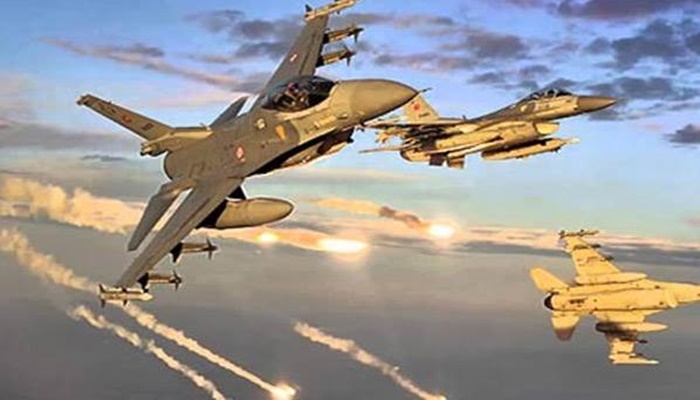Turkish warplanes on Tuesday carried out fresh airstrikes in northern Iraq, targeting outlawed Kurdistan Workers’ Party (PKK) positions, after a PKK attack left one Turkish soldier dead and four injured the same day, the defense ministry announced.
Suspected PKK positions in the Metina, Zap, Hakurk, Gara and Qandil regions in northern Iraq’s semi-autonomous Kurdish region were hit in the airstrikes, according to the ministry’s statement on X.
Hiç bir şehidimizin kanını yerde bırakmadık, bırakmayacağız!
Irak’ın kuzeyindeki Metina, Zap, Hakurk, Gara ve Kandil bölgelerinde terör örgütü PKK tarafından kullanıldığı tespit edilen; sığınak, barınak ve mağaralardan oluşan toplam 27 hedef, düzenlenen hava harekâtları ile imha… pic.twitter.com/ZGb75NAJ59
— T.C. Millî Savunma Bakanlığı (@tcsavunma) March 19, 2024
The warplanes reportedly destroyed 27 PKK targets, including caves, bunkers and shelters.
“We have not left the blood of any of our martyrs on the ground,” the ministry said in its statement, referring to the casualties in the PKK attack earlier in the day.
Turkey has since 2019 conducted a series of cross-border operations in northern Iraq against the PKK.
Lt. Hulusi Elçi, a military doctor, was killed in a clash with the PKK on Tuesday in the northern Iraqi region where the Turkish armed forces are deployed, as part of the “Claw-Lock” operation.
The PKK, designated as a terrorist group by Turkey and much of the international community, took up arms against the Turkish state in 1984. More than 40,000 people have been killed in the conflict.
The conflict was long fought mainly in rural areas of southeastern Turkey but is now more focused on the mountains of northern Iraq’s semi-autonomous Kurdistan region, where PKK militants are based.
The Iraqi federal government in Baghdad and Kurdish authorities in Arbil have for years been accused of turning a blind eye to the Turkish bombardments to preserve their strategic alliance with Ankara, a key trading partner, despite statements protesting violations of Iraqi sovereignty and harm to civilians.
In a landmark development last week, the Iraqi National Security Council banned the activities of the PKK on its soil, calling it a threat to the country, as relations with neighboring Turkey are on a course of improvement.
The decision of the Iraqi council came following a security meeting in Baghdad with high-level Turkish military and government officials including Foreign Minister Hakan Fidan, Defense Minister Yaşar Güler and intelligence chief İbrahim Kalın.

